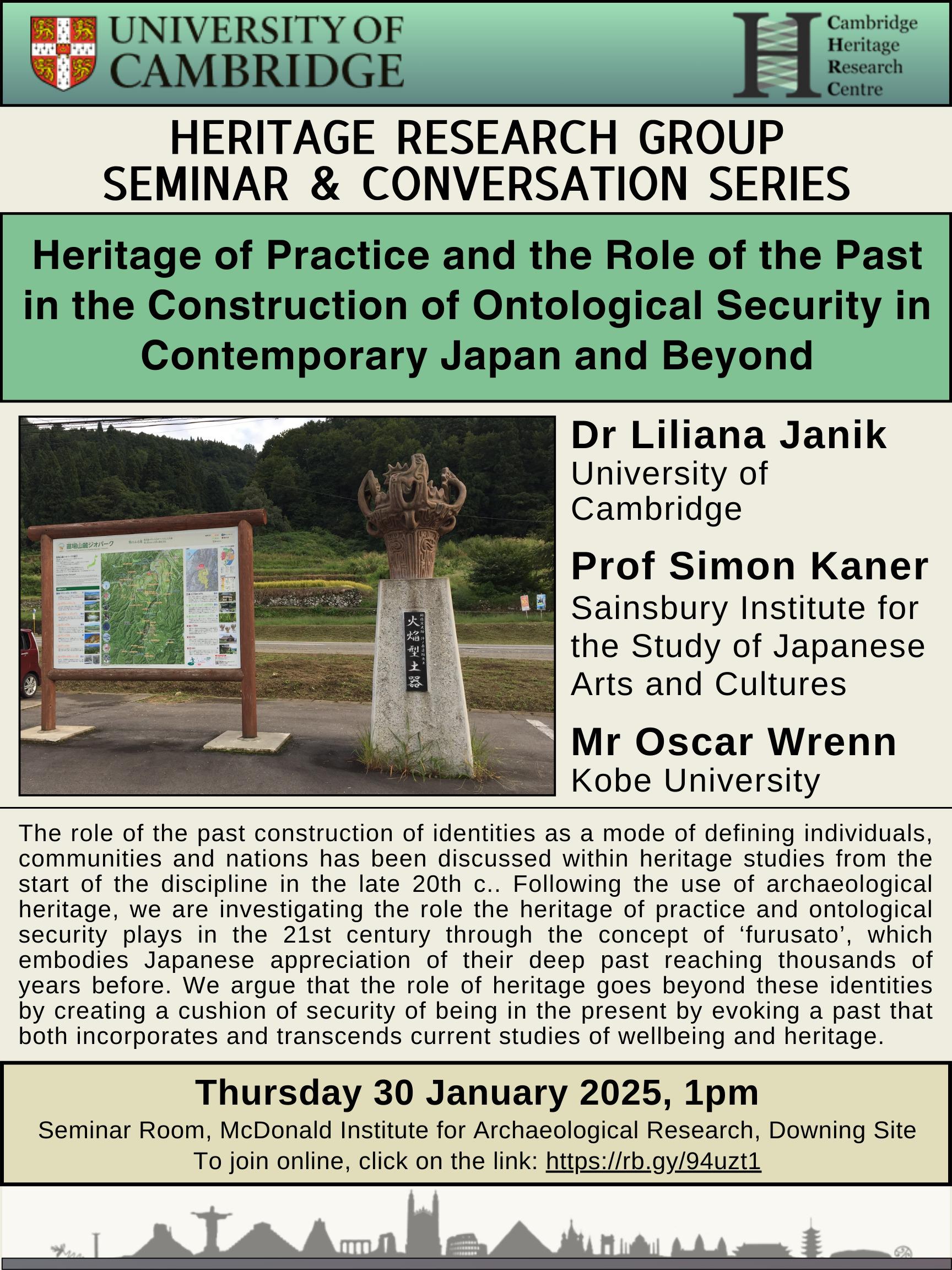
'Heritage of Practice and the Role of the Past in the Construction of Ontological Security in Contemporary Japan and Beyond'
Dr Liliana Janik (University of Cambridge)
Prof. Simon Kaner (Sainsbury Institute for the Study of Japanese Arts and Cultures)
Mr Oscar Wrenn (Kobe University)
Thursday 30th January, 2025
- This is a hybrid event, held at the Seminar Room, McDonald Institute for Archaeological Research, Downing Site and online
- To join online please use the following link: https://rb.gy/94uzt1.
The role of the past construction of identities as a mode of defining individuals, communities and nations has been discussed within heritage studies from the start of the discipline in the late 20th c.. Following the use of archaeological heritage, we are investigating the role the heritage of practice and ontological security plays in the 21st century through the concept of 'furusato', which embodies Japanese appreciation of their deep past reaching thousands of years before. We argue that the role of heritage goes beyond these identities by creating a cushion of security of being in the present by evoking a past that both incorporates and transcends current studies of wellbeing and heritage.
Dr Liliana Janik is an Associate Professor in Archaeology and Heritage, the co-director of the Heritage Laboratory at the Department of Archaeology at the University of Cambridge, and a fellow at Girton College. She graduated from the Nicolaus Copernicus University of Toruń, Poland and received her PhD from Cambridge University. She teaches undergraduate courses and is Director of MPhil in Heritage Studies at the University of Cambridge. Liliana led research projects in Northern and Southern Russia, currently, her work focuses on visual art and the heritage of ancient Japan. Her work focuses on visual art and the heritage of ancient Japan. Her work was a part of a number of exhibitions (Norway, Poland, Russia, UK), while in 2028-2019 she co-curated the exhibition White Sea Rock Art: Skiing, Whaling and Polyphonic Story Telling in Ulsan, Southern Korea, 2018-2019. Her latest book The Archaeology of Seeing. Science and Interpretation, the Past and the Contemporary Visual Art was published by Routledge, 2020. Her recent article associates the art of contemporary Japanese artists and the art of Palaeolithic European cave art "Leiko Ikemura: avoiding the gaze", in Leiko Ikemura: Usagi in Wonderland. S. Kaner (ed). Berlin: Kettler, 81-85, 2024.
Professor Simon Kaner MA (Cantab) PhD is the Director of the Centre for Japanese Studies at the University of East Anglia and Executive Director of the Sainsbury Institute for the Study of Japanese Arts and Cultures, where he is also Head of the Centre for Archaeology and Heritage. A Trustee of the Society of Antiquaries of London, he is an archaeologist specialising in the prehistory of Japan. His recent publications include An Illustrated Companion to Japanese Archaeology (2nd ed. 2020), The Archaeology of Medieval Towns: Case Studies from Europe and Japan (ed. 2021) and Japan and the World: artistic and cultural flows (ed. 2021). He is currently co-editing The Oxford Handbook of the Archaeology of Korea and Japan. He has undertaken archaeological fieldwork in the UK and many parts of Europe, as well as in Japan. Prior to joining the Sainsbury Institute, he was in charge of development-led archaeology for the county of Cambridgeshire. He has been a Council Member of the Society for East Asian Archaeology and the Norfolk and Norwich Archaeological Society. He has curated a number of exhibitions, including at the British Museum, the Fitzwilliam Museum in Cambridge and the Sainsbury Centre in Norwich. The most recent was Circles of Stone: Stonehenge and Prehistoric Japan at the Stonehenge Visitor Centre in 2022-23. His current research projects include Global Perspectives on British Archaeology www.global-britisharchaeology.org and Nara to Norwich: art and belief at the ends of the Silk Roads www.naratonorwich.org.
Mr Oscar Wrenn is an anthropologist based in Japan (PhD candidate at Kobe University), whose work focuses on everyday agricultural practice in upland rural areas affected by depopulation and agrarian change. In Particular, his writing deals with issues of rhythm and disruption in banal, sensory engagement with people's surrounding environment as part of practice, as a means to understand both the knotty constitution of rural landscapes over broad temporal and spatial scales, as well as affective understandings of space. His publications include "Lost in the Fields" Wayfinding and Disorientation Within a Japanese Agrarian Landscape, Japanese Review of Cultural Anthropology, 63-106, 2023.
